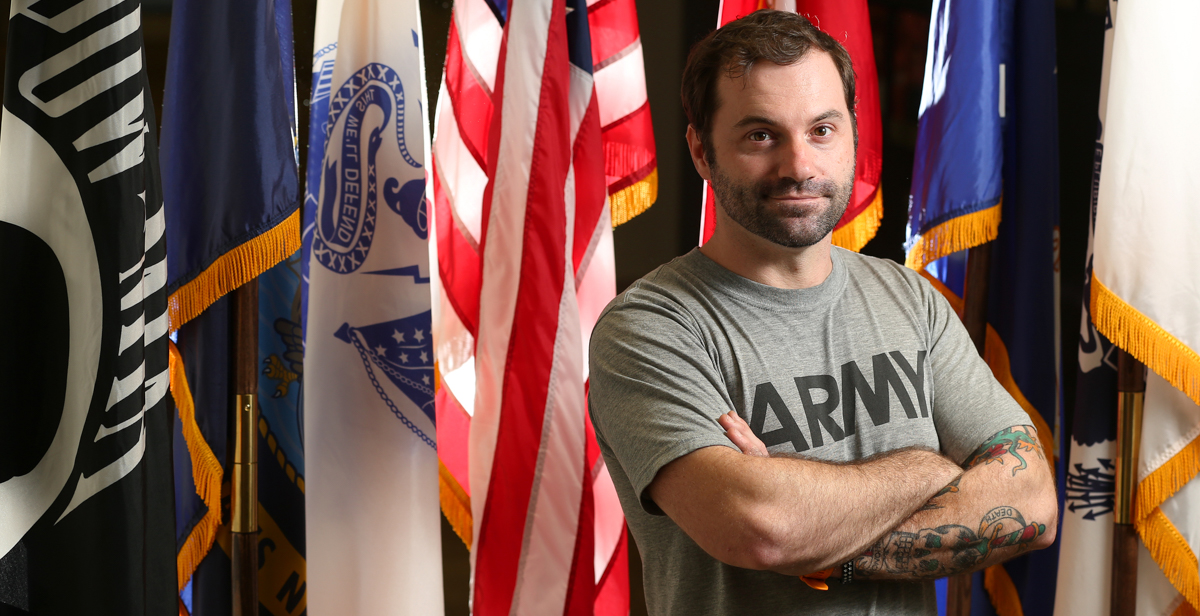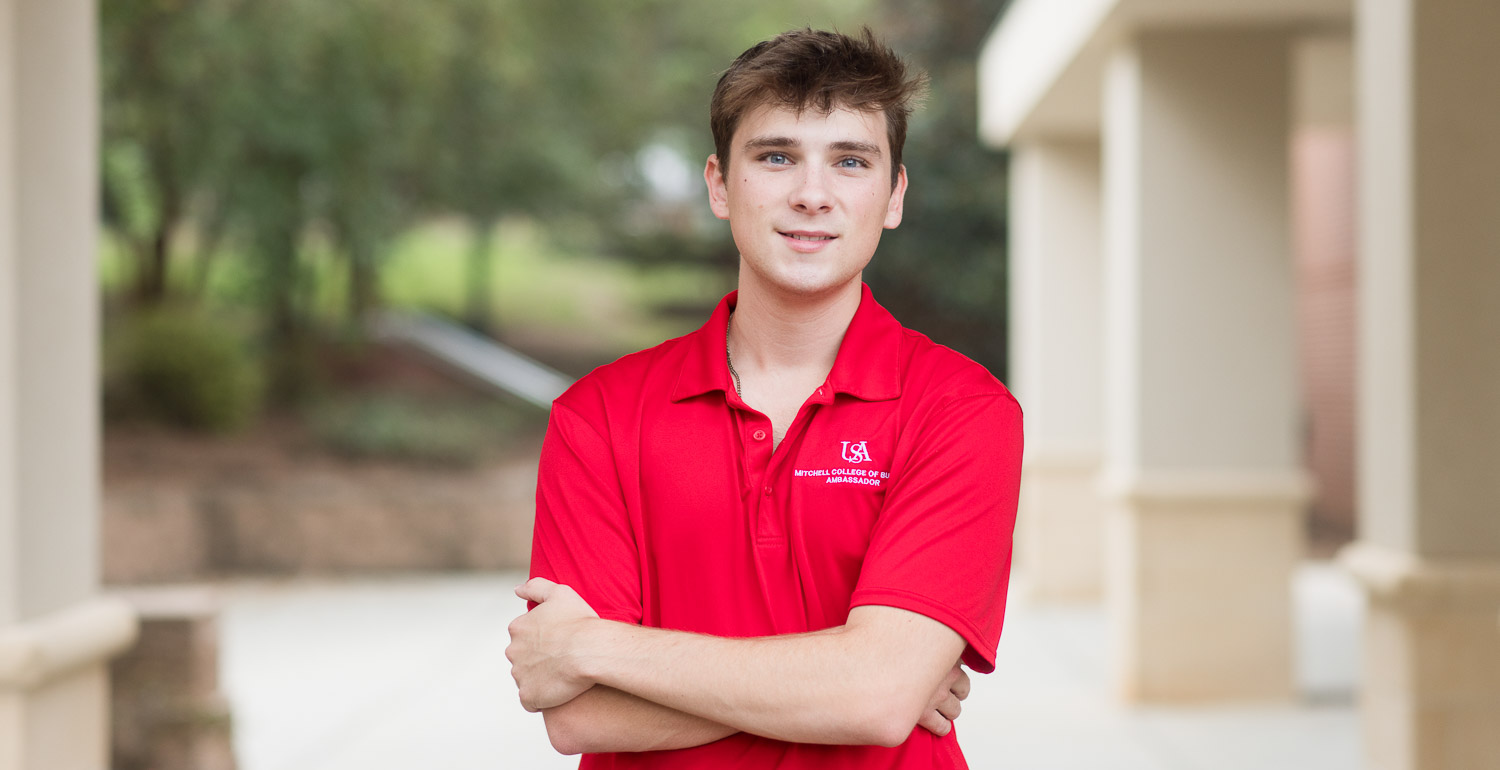Paving a Way Forward, Helping Others
Posted on November 8, 2019

“Everybody reacts to trauma differently,” said Zack Aggen. He reacts by helping.
Aggen knows a lot about trauma. As a U.S. Army medic during two combat tours in Iraq, he saw terrible wounds, heard horrifying screams of pain and worked desperately to save the lives of the fellow soldiers who had become, in his word, “family.”
Aggen also remembers a quieter but still agonizing trauma: feeling “lost and hopeless” as he transitioned from the structured intensity of his military career to a baffling civilian life where none of the skills he’d learned seemed of any use.
“When I first got back,” he said, “I went from putting in chest tubes and bandaging amputations to the only job I could find, which was as a patient care tech at St. Vincent’s hospital in Birmingham. I went from saving people’s lives to changing bedpans.”
Now a second-year medical student at the University of South Alabama, Aggen managed to find his way to a future he envisioned on his hardest days. A little guidance from someone who had been where he’d been would have made it a lot easier.
So that’s what he now provides. He tutors and mentors a half-dozen South undergraduates as part of a national program called Peer Advisors for Veteran Education. PAVE, which began as a pilot program in 2012, operates out of the University of Michigan. It now has 46 partner campuses. In September 2019, South became the first in Alabama.
Joshua Missouri, South’s coordinator of veterans affairs (and a Navy veteran himself), runs South’s PAVE program. The University has about 350 students who are veterans or service members. When Missouri proposed that South sign on with PAVE, he said, “We got institutional support almost immediately. We got funding. That shows the commitment from the University to serve veterans.”
PAVE is a low-key, all-volunteer program. Aggen is one of a half-dozen or so peer advisers at South. They’re military veterans who have already experienced at least a year or two of campus life. They’re trained to support incoming veterans who are just starting college.
Aggen tutors in math and science, listens if the undergrads want to talk, gives them tips about campus services and outside organizations that might be a good fit and even recommends babysitters and local schools. Whatever they need.
As a med student, he’s paired with undergraduates in health fields. Two-thirds are women. To them, he represents someone who understands. Even now, 11 years after leaving the Army, “There are very few people I will talk to things about,” he said. “Mostly it’s other service members. It’s hard to open up to people who aren’t service connected in some way.”
He makes sure to check in regularly. “The thing I’m really sensitive to is veteran suicides. I’ve had several friends who have killed themselves. And so being another advocate for guys who may be struggling, that’s what’s important to me.”
Aggen spent four and a half years with the 1st Battalion, 26th Infantry Regiment, 1st Infantry Division, which was based in Germany during his service. In 2004-05 and 2006-07, he was deployed to Iraq. In 2007, as part of the increase in troop strength known as “the surge,” his battalion suffered the most combat deaths of any Europe-based U.S. military brigade in Iraq.
After he left the Army in 2008, he lived down the street from a police station in Birmingham. “Every time their siren would kick off, it would make a sound like an incoming mortar,” he said. “I would freeze. It went on for a year before I finally got used to it.”
He started college that year at the University of Alabama at Birmingham and graduated in 2011 with a degree in molecular biology. He had already taken a couple of college classes while in the service. He squeezed the rest into three years because GI Bill education benefits end after 36 months.
At UAB, he met the woman who became his wife. Dr. Ashlen Aggen is now a family medicine physician in Bayou La Batre, a half-hour south of the USA campus. The Aggens have three children, boys who are 11 and 5, and a 1-year-old girl.
After Ashlen’s graduation from UAB, South accepted her into medical school and, later, residency. Zack took advantage of an Alabama program that fast-tracks high school teaching certificates for holders of college math or science degrees. He taught for seven years, supporting his wife through her medical training.
Then it was his turn. Aggen, now 34, finally has an opportunity to fulfill a promise he made to himself during his medic days to learn everything he can about medicine. He and his wife would like to work together to meet the medical needs of an underserved community like Bayou La Batre. They haven’t figured out all the details.
“She does family medicine, so she can do the cradle-to-the-grave care,” Zack said. “So things that I might do are obstetrics or general surgery or something else that’s needed out there. I don’t know yet, really.”
Meanwhile, he’s helping with the PAVE program. And organizing rural healthcare initiatives. And carrying out the duties associated with being president of his class. And coaching a special needs baseball team. And helping care for his three kids.
“I’m just one of those people who can’t take his foot off the gas,” he said.
And what keeps him from crashing and burning, like too many other combat veterans? “The honest answer is my wife. She met me when I was still recovering from that experience and chose to stay with me even though I was a mess. She’s still supporting me as I get through my medical training. I wouldn’t be where I am without her.”
Most veterans don’t have an Ashlen. Most who go to college don’t fit in with students just out of high school. Missouri, South’s veterans affairs coordinator, gives an example: People fresh out of the military tend to speak directly, even bluntly.
“They mean well,” he said. “But it’s not interpreted that way sometimes. So they need help with those soft skills.”
And when they need help with academic skills, Aggen said, “It’s tough to sit there and be tutored by some 19-year-old kid with no life experiences. It’s hard to relate.
“But if you’ve got this gruffer, tatted-up old dude who happens to be good at whatever you’re struggling at, it helps. Then it’s like, I don’t feel so different.”
For information about programs for veterans at South, call 251-460-6230 or email joshuamissouri@southalabama.edu.



